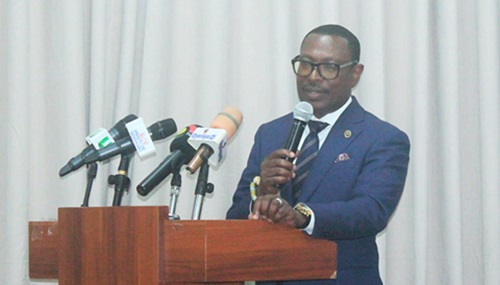A Sustainable Energy Specialist, Wisdom Ahiataku-Togobo, has emphasised the need for Ghana to diversify its energy sources to support the government’s 24-hour economy policy.
He explained that the country’s heavy reliance on hydropower and natural gas was insufficient to sustain a round-the-clock economy, warning that without diversification, Ghana risked supply shortages and instability that could hinder industries and businesses operating beyond regular hours.
Speaking at a public lecture organised by Energy News Africa Ltd on the theme, “24-hour Economy: Can Ghana’s Current Energy Situation Support This Policy?”, Mr Ahiataku-Togobo backed his argument with key statistics, stressing the need for urgent investment in nuclear energy and coal power creating the environment for the incorporation of solar and wind to create a more resilient power system.
The energy specialist highlighted that China, India, Brazil, and South Korea had successfully built energy systems capable of sustaining 24-hour economies through coal, nuclear, hydropower and renewables.
China, for example, he said had increased its installed power capacity from 220GW in 1990 to 2,920GW in 2023, primarily through coal. India similarly grew from 66GW in 1990 to 416GW in 2023, offering low electricity tariffs to support industry.
Mr Ahiataku-Togobo argued that the nation’s Energy Transition Investment Plan, which targets 90 per cent renewables and 10 per cent nuclear by 2060, was too ambitious and did not align with the strategies of industrialised nations.
Instead, he called for a balanced energy mix including clean coal, natural gas, and nuclear power, along with grid expansion and natural gas pipeline investments to ensure stable, affordable electricity.
”These have the potential to provide affordable, clean and reliable baseload power for stimulating industrial development and the integration of solar and wind in the long term,” he added.
Government effort
The Head of Innovative Finance, Partnership, and Markets at the 24-hour Economy and Accelerated Exports Secretariat, Dr Ishmael Nii Amanor Dodoo, said the government was implementing bold reforms in the energy sector to ensure uninterrupted power supply for the successful rollout of the 24-hour economy policy.
![]()
A section of participants seated in the lecture.
He noted that investments were being made to expand renewable energy capacity, modernise transmission infrastructure, and enhance grid efficiency to meet the increased demand from businesses operating round the clock.
He further stated that efforts were underway to diversify the country’s energy mix with solar, wind, and natural gas to ensure long-term sustainability.
Additionally, Mr Dodoo highlighted ongoing discussions with financial partners to secure funding for smart grid technology and energy storage systems to improve reliability to create a competitive business environment and drive economic growth with key sectors such as manufacturing, agriculture, hospitality and health leading the charge.
Panel discussion
Panellists discussed the need for strategic energy planning to sustain economic growth.
They highlighted the challenges of power supply, emphasising the importance of ensuring demand forecasts aligned with realistic expectations.
They also stressed the necessity of investment preceding demand, advocating for flexible planning to accommodate market changes.
The role of government and private sector collaboration was debated, with concerns over policy implementation speed.
The conversation also touched on challenges such as electricity payment systems, the transition to a 24-hour economy, and streetlight maintenance issues.
Ultimately, the panel agreed that addressing current inefficiencies was key to sustaining future energy expansion.

